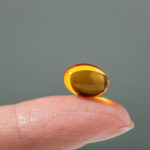By David Blyweiss, M.D., Advanced Natural Wellness
July 12, 2012
- What you need to know about vitamin B12
- Who needs a B12 shot?
- The hidden danger of the indigestion myth
Third issue in a series of 3 on Energy and Aging
It’s no secret B vitamins – especially vitamin B12 or cobalamin – are considered the high-energy nutrients. Everything from soft drinks to energy bars – even hangover remedies – are boasting a lot of B’s these days.
But the B’s are tricky. It’s not that they’re hard to get in your diet. It’s that they’re hard to absorb into your system through proper digestion.
Especially as you get older.
So while taking “extra” doses of B vitamins might seem like a good idea, it can be a waste. Literally. The truth is, the body simply flushes out any nutrients it can’t absorb and use or store.
MD Exposes the Hidden Danger to Your Eyes

When your eyesight starts to fail, it's a real problem. Suddenly you can't go to the grocery store... you can't get to the doctor if you have an emergency... you can't meet your friends for dinner…
Your "regular" doctor doesn't have time to keep up with the latest research. And the same goes for eye doctors. They go to school to learn how to fit you for glasses and contacts, but have no way of preventing the damage and loss of eyesight that threatens your freedom and independence.
Let me show you something that explains a LOT about how your eyes work.
In my FREE Special Report, I'll show you a HUGE, untapped resource for your eyes that safely and naturally restores clear, effortless eyesight.
Click here to get started...
And yet, vitamin B12 deficiency can be a serious problem. It is more common than you might think, with more serious complications than you might know.
Should you have your levels checked? Absolutely. And if they are low, should you get regular B12 shots, improve your digestion… or both?
Here’s the scoop…
Like CoQ10, vitamin B12 can be found in every cell of the human body, and is a key nutrient in our metabolism and energy production. Plus, it plays a role in skin health, immune and nervous systems, and muscle tone. By changing carbohydrates into glucose, B12 acts as fuel for your body.
Not enough B12 means not enough fuel. Plain and simple.
The conversion from food to fuel requires two important steps. First, hydrochloric acid in the stomach separates the vitamin from whatever protein it’s attached to. Then, the B12 combines with a new protein that lives in the stomach called intrinsic factor and is transported throughout the body.
If your body isn’t handling either of these two key steps efficiently, you’re not going to get enough B12 in your system… no matter how much you ingest.
Are You Suffering From...
- Love handles and a pot belly
- Romance that isn't what it used to
- Forgetfulness and inattention
- Low (or no) strength and endurance
- A sex drive that's shifted into neutral...or worse
If so...you may have Mature Male Burnout. Click here to discover more about this unique condition and what you can do about it.
Here’s the problem…
As you age, you have less hydrochloric acid in your stomach. Certain health conditions can inhibit your ability to produce intrinsic factor. And some common medications, such as proton pump inhibitors and antibiotics, can interfere with both. Leaving you feeling tired, weak, and maybe even constipated, confused and depressed.
Sure, you may joke about your age and your energy. But it’s really not funny. And it may not be necessary.
If you expect to have energy as you age – which you should – then you won’t accept these symptoms as a natural part of the aging process. I certainly don’t accept it in my patients, and when we come across these classic symptoms, vitamin B12 deficiency is one of the first places we look.
While the entire B-Complex is important, only B12 can be stored in the body. This means that deficiency can happen gradually, as the body uses its reserves – usually over the course of 2-5 years. This can cause a delay in recognizing symptoms – with disastrous consequences such as dementia, confusion and memory loss. Getting your levels back to normal can often reverse symptoms – unless they’ve gone on long enough to create permanent damage.
That’s why I highly recommend not waiting to have your levels checked.
You can ask your doctor to check your vitamin B12 levels from a simple blood test. But unless you have something called macrocytic anemia they may tell you that its unnecessary.
The problem with that explanation is it may take a couple of years of B12 deficiency to have a macrocytic anemia. An even better test that tells if you are becoming B12 deficient is testing for methylmalonic acid (methylmalonate) in the urine, which spills over when there isn’t enough B12 to metabolize it.
The urine test is more specific. It’s also a better indicator of B12 distribution and function. Just as important, many “older” people 60 and above can have “normal serum” B12 levels and be metabolically deficient in it.
While B12 injections are the quickest way to raise B12 levels, sublingual B12 works well too if taken at 1000mcg-5000mcg doses at least three times a week.
There are a couple of other factors that might be affecting your levels of vitamin B12…
If you are one of the 118 million people who take the strongest pharmaceuticals for acid reflux – also known as proton pump inhibitors – you could be at a higher risk for vitamin B12 deficiency.
The truth is, stomach acid is a critical element of nutrient absorption. Without it, there are many nutrients you simply aren’t getting enough of, no matter how thoughtfully you eat. Consider finding ways to relieve your indigestion naturally and coming off the medication.
Last but not least, here’s a special note for vegans and vegetarians: Vitamin B12 is found in highest amount in animal products. Vitamin B12 deficiency is one of the biggest challenges to vegans and vegetarians. You’ll want to get tested regularly, consider regular supplementation or injections, and also, look for food products that are fortified with vitamin B12 at the grocery store.
In your youth, a few extra cups of coffee and a good night’s sleep every now and then might have been enough to keep your tank full. But as you age, your entire system






